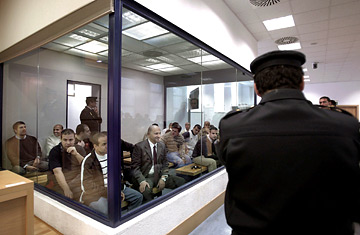
A police officer stands in front of a glass cage holding the Madrid train bomb suspects at the national Court in Madrid.
Spain's National Court issued its verdict in the March 11, 2004, Madrid bombing case on Wednesday, convicting 21 of 28 suspects, and offering substantial indemnifications to the victims. The sentence also appeared to dismiss suggestions, long posed by Spanish political conservatives still smarting from Socialist Jose Luis Rodriguez Zapatero's unexpected election three years earlier, that the Basque separatist group ETA was somehow involved in the attacks, which killed 191 people and injured nearly 2000 more. But just because lead judge Javier Gómez Bermudez was firm in saying that ETA had nothing to do with the plot, it doesn't mean the Basque group's influence was totally absent from the ruling.
The court's sentence focused on the bombing's Islamist planners and their Spanish supporters. A few of the accused, like "material author" Jamal Zougam and Emilio Suarez Trashorras, who stole the explosives used in the attacks, received extensive prison sentences (Zougam got more than 40,000 years; Suarez more than 30,000). But many of the rest received only light sentences for belonging to or collaborating with a terrorist organization, and seven, including alleged mastermind Rabei Osman, were found innocent of any crime.
The light sentences and acquittals came as a surprise not only to the victims' families, but to some experts as well. Fernando Reinares, director of the Program on Global Terrorism at Spain's Royal Elcano Institute, says he expected more guilty sentences and harsher punishments. "The police and judicial investigations had gathered abundant evidence to condemn some of those who were not convicted or who received light sentences," he says. For Rogelio Alonso, terrorism expert at King Juan Carlos University, there was "sufficient evidence to show that several members of the March 11 cell had very close links to al-Qaeda leaders." But the sentencing remarks made no mention of al-Qaeda.
Experts attributed the light sentences and acquittals to the conservative bent of he Spanish legal system. Spanish security forces, long accustomed to fighting the Basque separatists, have changed tremendously in the past three years, adapting to international terrorism by dramatically increasing their manpower and uniting distinct police and intelligence bodies into a single entity. The judicial system, however, hasn't necessarily kept pace. "In Spain, the tendency is toward conservative legal reasoning among judges," says Reinares. "With ETA, they're accustomed to only using direct, proven facts to convict. But international terrorism doesn't work that way — they leave different kinds of evidence. To convict, you have to take indirect evidence into account, especially when, as in this case, there is so much of it."
In the case of Osman, the alleged mastermind, for example, the evidence included his own statements made on the phone suggesting a planning role in the bombings, and a suspicious note found in his Milan apartment. What was found on the piece of paper, according to the court summary, was, "11 M Shaid." The "11 M" is how the Spanish refer to the March 2004 bombings and "Shaid" translates literally as "honey," but a witness said it was also used as slang for "explosives." That evidence was enough to get him convicted in Italy for belonging to a terrorist group, but not enough to get him convicted for the Madrid bombings.
